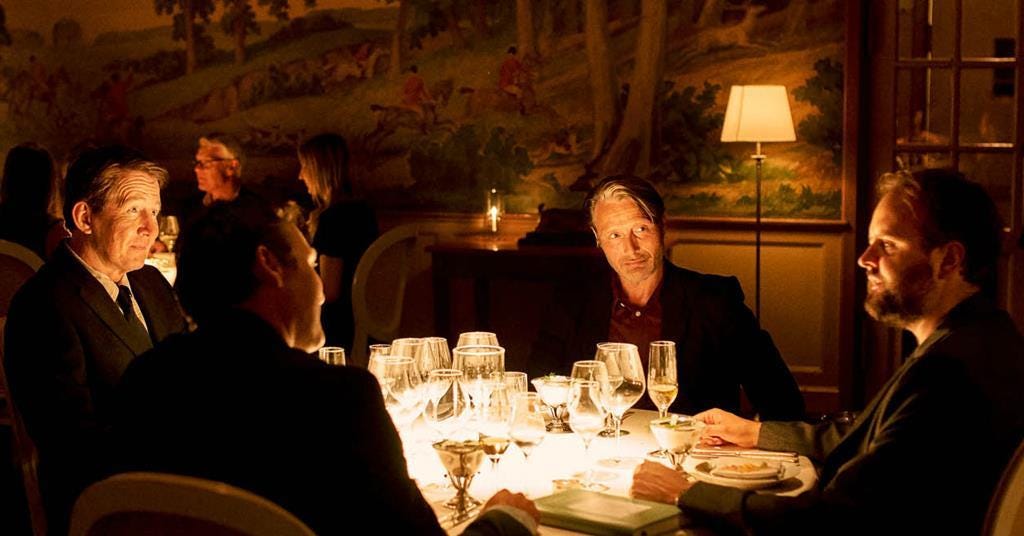This week's double feature has been split due to length. Five Easy Pieces will be published on 1/13.
“And that is why I love this world, despite its need and strife.”
Thomas Vinterberg was going to make a movie about over-intoxication in Denmark, a nation that has the highest teenage drinking rate in the world. It was to be “a celebration of alcohol based on the thesis that world history would have been different without alcohol, ” Vinterberg stated. “[It was going to be] an angrier film.”
There are strands of this in the final version, as Another Round opens with rapturous students running around a lake chugging cases of beer. Languished, throaty vocals rise up, like some ancient European harvest song. The students vomit, they kiss, they laugh. The vocals transition into a drum beat, revealing itself to be a cover of the pop song “What a Life.” Time is bridged as beer sprays out of a teen’s nose. Since 7000 BC, humans have been drinking, and we don’t show any signs of stopping.
Yet, four days into filming, Thomas’ daughter Ida was killed in a car accident.1
Another Round became something else: an affirmation of life. A movie about four Danish school teachers — Martin, Nikolaj, Tommy, and Peter (Mads Mikkelsen, Magnus Millang, Thomas Bo Larsen, Lars Ranthe, respectively) — embarking on a scientific study of how daily alcohol consumption affects their life. The premise is simple, yet Vinterberg and his team have created something profound. Not just a film about guys being dudes or a scold about the dangers of alcoholism, but a work of art that shows us what makes life worth living — despite its need and strife.
Martin, a joyless history teacher and one-time jazz danseur, has closed himself off to the world. His students call him indifferent. His wife Anika (Maria Bonnevie) says he’s become boring. He speaks in one or two word sentences. He is a shockingly handsome man, but Mads’ performance of Martin is shrunken and weepy. It’s as if he's bottled himself so deep that his tiny soul must puppet his normal-sized body.
At a birthday dinner early in the film, Nikolaj informs the three sad sack teachers of psychiatrist Finn Skårderud’s theory that humans are at their peak performance when at a BAC of 0.5%. They are more relaxed, poised, “musical and open.” Miraculously, when Martin takes his first sip of wine, a choir performance begins in the next door dining room. After four quick drinks, he begins to weep. A few bottles later, him and his three colleagues are ecstatic, wrestling each other in the dirt.2
After this revelatory night, the four men agree to secretly study how increased BAC levels affect their day-to-day lives, maintaining a BAC of 0.5% during the day without drinking after eight PM or on the weekends.3 As they begin, the benefits are immediate. Each teacher begins to grow outward, becoming invested in the minutiae of their lessons, in the lives of their students, in their own relationships and passions. Angelic orchestral music is often played through these moments of inebriated triumph. As Martin and his friends become more of themselves, the heavens flow through them in strings and falsetto voices. The musicality of life still returns to Martin.
As you can probably guess, the party cannot last. Allowances are given, BACs are raised, lives are quickly ruined. It’s a sobering segment of the film, aptly referred to by Nikolaj as “total oblivion.”4 Yet, what makes Vinterberg such an incredible filmmaker is that this descent into life’s shadowy valley is not a scolding proclamation of teetotalism, let alone moderation. Drinking is never presented as the root of our character’s sorrows, but instead an amplifier of their lives. It’s never purely good or bad, instead it’s up to the characters to choose whether they are drinking for misery or for joy. Whether they are viewing life as a train that has passed them by, or a celebration and acknowledgment of their failures.
When three of our teachers reunite at a funeral late in the film, it’s a suitably heart wrenching conversation — until it isn’t. They joke, learn about each other's new relationships, and plan for the future. A party bus drives by, the recent graduates dressed in white sailor outfits and wreathed in blooming flowers. “What a Life” blasts from the champagne soaked speakers. An affirmation of life among death. Surrounded by youth, love, and liquor, Martin drinks for joy for the first time. What follows is an explosion of the self. The ultimate catharsis. One of the great movies of the last century.
Another Round is available to stream on Hulu.
Special thanks to Austin Smoldt-Sáenz, Elena Bruess, Joshua De Lanoit, and Max Seifert.
The film is dedicated in her honor. Vinterberg’s acceptance speech for Best International Film at the 93rd Oscars is a moving tribute to her worth watching.
One of the funniest cuts in history is from the slight buzz of dinner to Mads shaking his ass like a worm in a speed-walking competition with his drunken friends.
A strange stipulation based on the life of Ernest Hemingway, whose suicide is mentioned in the film without being interpreted as a potential red flag for how this experiment will turn out.
A horrific dance of death occurs late into the film, mirroring the hilarious living room shuffle the four do to The Meters’ “Cissy Strut” earlier. No music. Sweaty closeups. Bodies slamming into furniture. Screams of confusion. It’s an urgent nightmare that reminds us Vinterberg was the cofounder of the Dogme 95 movement.





